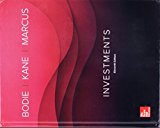
To calculate the value of call option using the given prices
Answer to Problem 36PS
Hence, the value of call option is
Explanation of Solution
Given Information:
You are attempting to value a call option with an exercise price of
Data can be summarized as follows:
Exercise price of call option
Time to expiration
Dividend payout
Stock price
Probability of stock price increasing to
Probability of stock decreasing to
Risk-free rate of interest
Methodology to arrive at the option value is as follows:
1. Calculate the probable call values
2. Then based on the call values arrived in both the cases, i.e. in case of stock price increase
and decrease, the hedge ratio needs to be calculated
3. Calculate riskless portfolio.
4. Then the present value of stock price highly probable at the end of year can be calculated.
5. Then set the value of hedged position equal to the present value of certain pay-off.
6. Finally, value of the call option can be calculated.
Step 1 Probable Call value for stock price
Probable Call value for stock price
Therefore,
Calculate the hedge ratio.
The hedge ratio, H can be calculated by using the following formula:
Here,
Value of the call option in case of in-the-money scenario is
Value of the call option in case of out-of-the-money scenario is
Stock price in case stock price increases is
Stock price in case stock price decreases is
Factor by which stock increases is
Factor by which stock decreases is
Substitute the values in the formula as follows:
Hence, the hedge ratio is
Create a riskless portfolio that consists of two written calls and one share of stock. The riskless
Portfolio's cost is
The following table shows the payoff of the portfolio to be risk free.
| Portfolio | |
|
| Buy 1 share | |
|
| Write 2 calls | |
|
| Total | |
|
Present value of portfolio is as follows:
Present value of stock price
Hence, the present value of portfolio is
Step 5:
Set the value of the hedged position equal to the present value of the payoff as follows:
Step 6:
Calculate the value of call option
Hence, the value of call option is
Want to see more full solutions like this?
Chapter 21 Solutions
Investments, 11th Edition (exclude Access Card)
- Hello tutor this is himlton biotech problem.arrow_forwardYan Yan Corp. has a $2,000 par value bond outstanding with a coupon rate of 4.7 percent paid semiannually and 13 years to maturity. The yield to maturity of the bond is 5.05 percent. What is the dollar price of the bond?arrow_forwardA trip goa quesarrow_forward
 Intermediate Financial Management (MindTap Course...FinanceISBN:9781337395083Author:Eugene F. Brigham, Phillip R. DavesPublisher:Cengage Learning
Intermediate Financial Management (MindTap Course...FinanceISBN:9781337395083Author:Eugene F. Brigham, Phillip R. DavesPublisher:Cengage Learning
